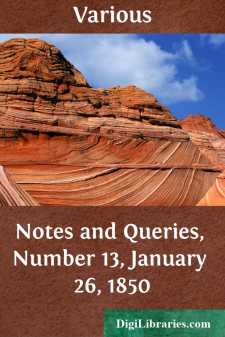Categories
- Antiques & Collectibles 13
- Architecture 36
- Art 48
- Bibles 22
- Biography & Autobiography 813
- Body, Mind & Spirit 142
- Business & Economics 28
- Children's Books 15
- Children's Fiction 12
- Computers 4
- Cooking 94
- Crafts & Hobbies 4
- Drama 346
- Education 46
- Family & Relationships 57
- Fiction 11828
- Games 19
- Gardening 17
- Health & Fitness 34
- History 1377
- House & Home 1
- Humor 147
- Juvenile Fiction 1873
- Juvenile Nonfiction 202
- Language Arts & Disciplines 88
- Law 16
- Literary Collections 686
- Literary Criticism 179
- Mathematics 13
- Medical 41
- Music 40
- Nature 179
- Non-Classifiable 1768
- Performing Arts 7
- Periodicals 1453
- Philosophy 64
- Photography 2
- Poetry 896
- Political Science 203
- Psychology 42
- Reference 154
- Religion 513
- Science 126
- Self-Help 84
- Social Science 81
- Sports & Recreation 34
- Study Aids 3
- Technology & Engineering 59
- Transportation 23
- Travel 463
- True Crime 29
Notes and Queries, Number 13, January 26, 1850
by: Various
Categories:
Description:
Excerpt
DOMINGO LOMELYN, JESTER TO HENRY VIII.
Shakespeare, in the Second Part of Henry IV. act v. sc. 3 makes Silence sing the following scrap:—
"Do me right,
And dub me knight:
Samingo."
And Nash, in his Summer's Last Will and Testament, 1600 (reprinted in the last edition of Dodsley's Old Plays, vol. xi. p. 47.) has
"Monsieur Mingo for quaffing doth surpass,
In cup, in can, or glass;
God Bacchus, do me right,
And dub me knight,
Domingo"
T. Warton, in a note in vol. xvii. of the Variorum Shakespeare, says, "Samingo, that is San Domingo, as some of the commentators have observed. But what is the meaning and propriety of the name here, has not yet been shown. Justice Silence is here introduced as in the midst of his cups; and I remember a black-letter ballad, in which either a San Domingo or a Signior Domingo, is celebrated for his miraculous feats in drinking. Silence, in the abundance of his festivity, touches upon some old song, in which this convivial saint, or signior, was the burden. Perhaps, too, the pronounciation in here suited to the character." I must own that I cannot see what San Domingo has to do with a drinking song. May it not be an allusion to a ballad or song on Domingo, one of King Henry the Eighth's jesters?
"—Domyngo Lomelyn,
That was wont to wyn
Moche money of the kynge,
At the cardys and haserdynge."
Skelton's Why come ye not to Courte,
ed. Dyce, ii. p. 63.
None of the commentators have noticed this, but I think my suggestion carries with it some weight.
In the Privy Purse Expenses of King Henry the Eighth (published by Sir H. Nichols, in 1827), are many entries concerning this Domingo, most of which relate to payments of money that he had won from the king at cards and dice. He was evidently, as Sir Harris Nichols observes, one of King Henry's "diverting vagabonds," and seems to have accompanied his majesty wherever he went, for we find that he was with him at Calais in 1532. In all these entries he is only mentioned as Domingo; his surname, and the fact of his being a Lombard, we learn from Skelton's poem, mentioned above.
The following story, told of Domingo, occurs in Mr. (afterwards Sir John) Harington's Treatise on Playe, 1597, printed in the Nugae Antiquae, edit. Park, vol. i. p.222.:—
"The other tale I wold tell of a willinge and wise loss I have hearde dyversly tolde. Some tell it of Kyng Phillip and a favoryte of his; some of our worthy King Henry VIII. and Domingo; and I may call it a tale; becawse perhappes it is but a tale, but thus they tell it:—The kinge, 55 eldest hand, set up all restes, and discarded flush; Domingo or Dundego (call him how you will), helde it upon 49, or som such game; when all restes were up and they had discarded, the kinge threw his 55 on the boord open, with great lafter, supposing the game (as it was) in a manner sewer. Domingo was at his last carde incownterd flush, as the standers by saw, and tolde the day after; but seeing the king so mery, would not for a reste at primero, put him owt of that pleasawnt conceyt, and put up his cardes quietly, yielding it lost."
Park was not acquainted with any particulars of this Domingo Lomelyn, for he says, in a note, "Query, jester to the king?"
The first epigram in Samuel Rowland's entertaining tract, The Letting of Humours Blood in the Head-waine, &c....












